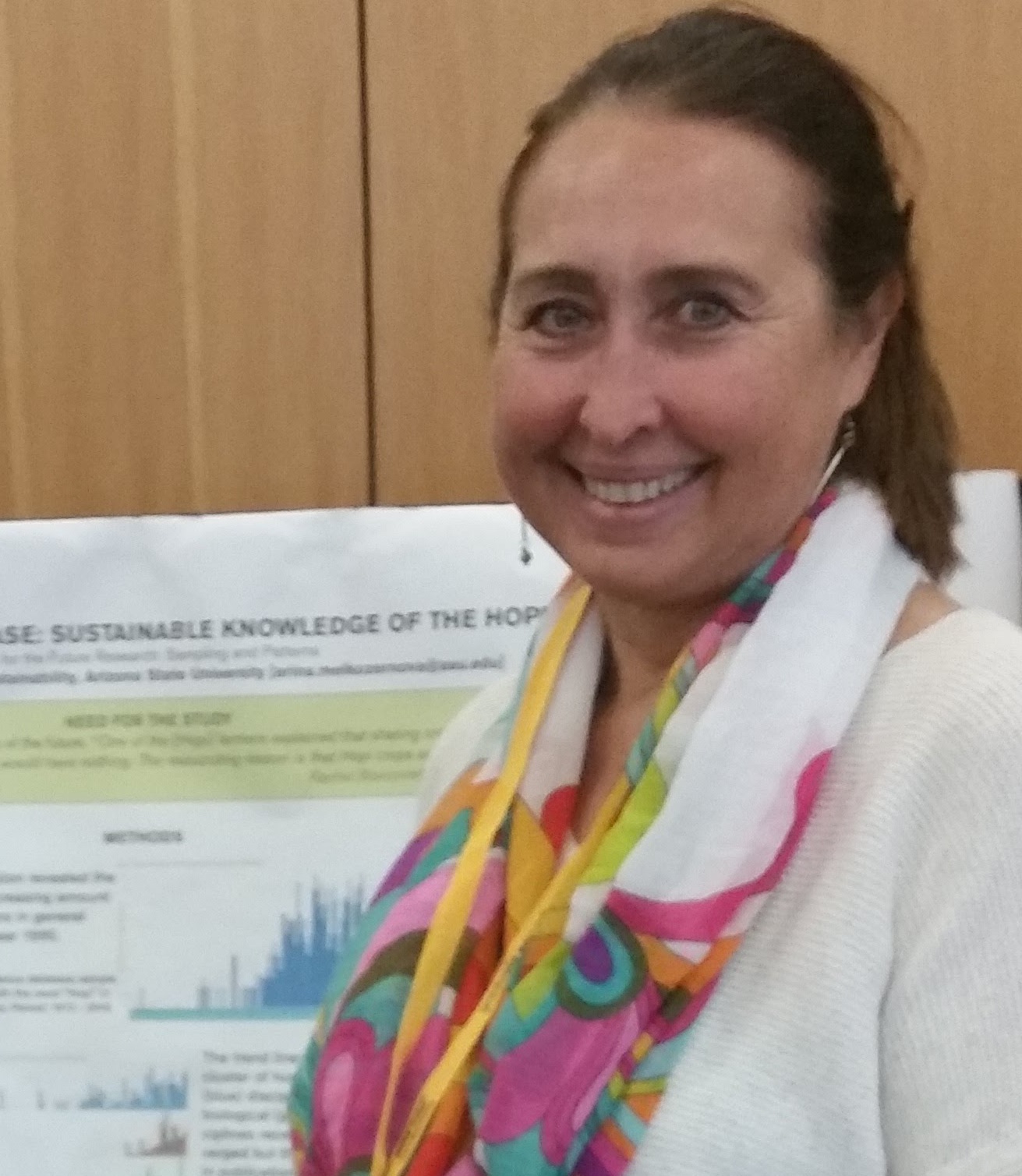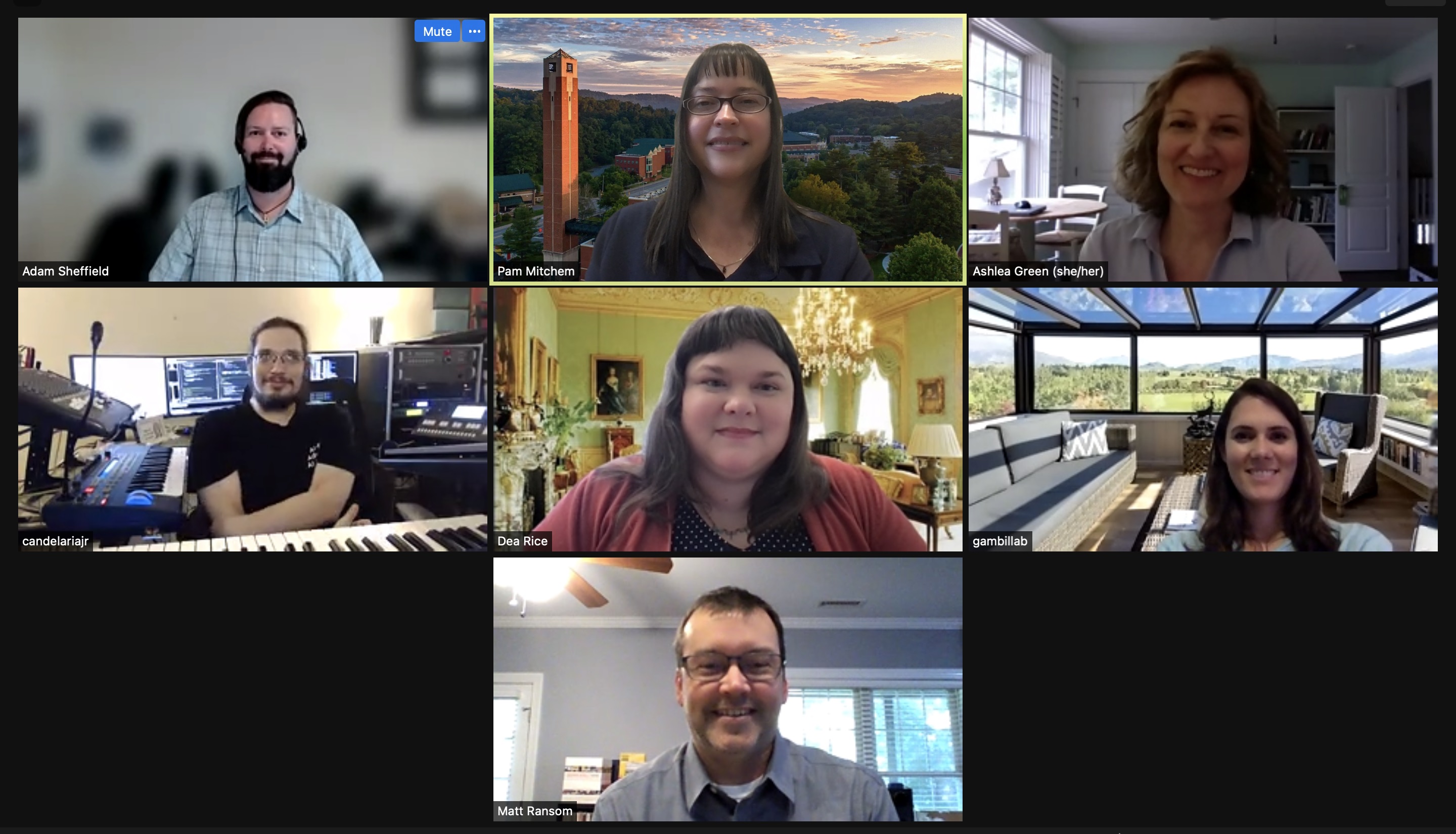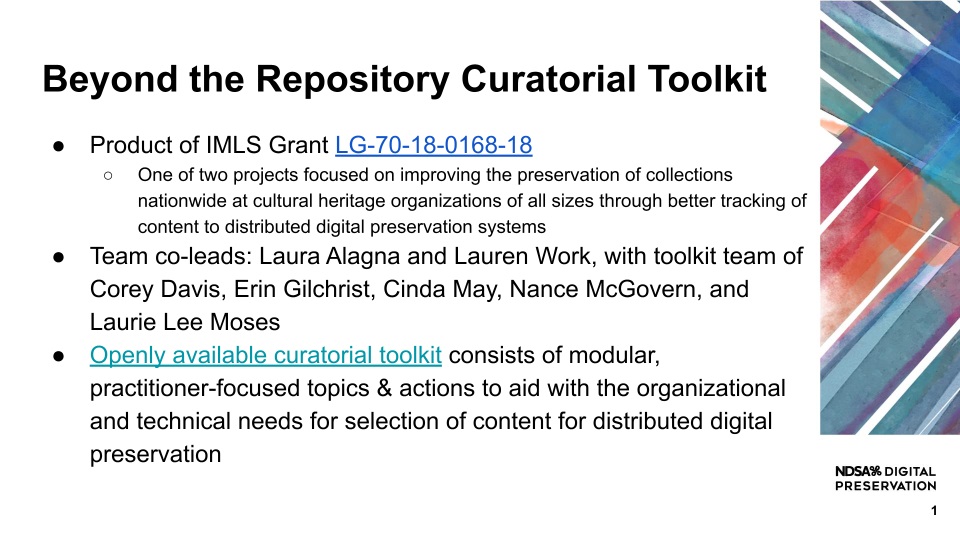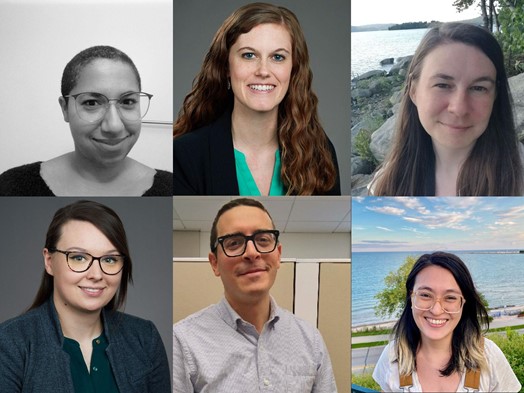2021 Excellence Award Winners
The 2021 Excellence Awards were announced at Digital Preservation 2021. The 2021 NDSA Excellence Awards Working Group was led by co-chairs Stephen Abrams (Harvard University) and Krista Oldham (Texas A&M University Libraries), with members Samantha Abrams (Center for Research Libraries), Lauren Goodley (Texas State University), Grete Graf (Yale University), Kari May (University of Pittsburgh), and Sharon McMeekin (Digital Preservation Coalition). Aliya Reich at CLIR provided administrative support for the entire awards process.
Current activites of the Excellence Award Working Group are available on the groups webpage.
Future Steward Award
Future Stewards are recognized as students and early-career professionals or academics taking a creative approach to advancing knowledge of digital preservation issues and practices. This year’s awardee in the Future Stewards category is:

Arina Melkozernova
Arina Melkozernova. A Ph.D. candidate at Arizona State University, Arina Melkozernova is recognized for her work on multiple projects, including: curation and translation in support of “A Journal of the Plague Year: An Archive of Covid-19,” created in response to the needs of Indigenous partners during the pandemic, and assistance to a partnership between Coushatta Tribal Archives and Arizona State University, in which she “explored new tools and software to help preserve, manage, and provide access to digitized material” to increase access to Coushatta history. Alongside archivists from the Coushatta Heritage Department, Arina worked with Mukurtu developers to create a site to ”satisfy the needs of a digital library, featuring important tribal governing documents, reports, photographs, maps,” and “shared her knowledge of best practices … to make Coushatta history accessible to tribal citizens.” Her work, alongside her studies, demonstrates Arina’s advocacy for “community-driven research that adopts Indigenous methodological and analytical frameworks,” and “contributes to advancing knowledge across a variety of fields.”
Individual Award
Individuals are recognized for making a significant contribution to the digital preservation community through advances in theory or practice. This year’s awardee in the Individual category is:

Kate Murray
Kate Murray is a Digital Projects Coordinator in the Digital Collection Management and Services unit at the Library of Congress where she leads the Federal Agencies Digital Guidelines Initiative Audio-Visual Working Group and the Sustainability of Digital Formats website. Previously Kate worked at the National Archives and Records Administration specializing in standardizing and documenting moving image and audio formats. She has served as a member or in a leadership role for several professional committees or organizations, including the AMIA Preservation Committee, ISO standards committees for PDF and EPUB, the Mellon Foundation/Digital Preservation Coalition (DPC) Task Force on Technical Approaches to Email Archiving, the PDF Association and the DPC Executive Board. Kate has had a profound impact on the field of digital preservation, as noted by her nominators, “Nearly everyone working in digital preservation has benefited from Kate’s expertise, whether they know it not, due to the breadth and impact of activities she participates in.” She is “a nexxus, a sharer, and a champion of good work taking place throughout the field.”
Organization Award
Organizations are recognized for innovative approaches to providing support and guidance to the digital preservation community. This year’s awardee in the Organizations category is:
The Digital Scholarship and Initiatives (DSI) Team at Appalachian State University

DSI team: (top, left to right) Adam Sheffield, Pam Mitchem, Ashlea Green; (middle) Jonathan Candelaria, Dea Rice, Agnes Gambill; (bottom) Matt Ransom.
The Digital Scholarship and Initiatives Team at Appalachian State University has a strong history of building and maintaining partnerships in the Appalachian region, including partnerships with communities that are less documented and underrepresented. The team’s multi-year commitment to digital scholarship projects that focus on diverse regional perspectives have made a significant contribution to the community, region and the field of Appalachian Studies. The DSI team supports documenting diversity within the region so that the public can access hidden collections about historical and underrepresented populations and cultures, for example a local Rosenwald School and Cherokee - Aniyunwiya material culture.
This is a small team and one of the few within the library that operates without a budget. Despite this, the team has been awarded grants from the NEH and the Mellon Foundation to tackle digital projects that focus on the Appalachian region. The Awards committee was impressed by this team’s example of “simply doing good work,” showing how a group of experts working together and providing support and services to their constituents, can advance the field of digital scholarship as well as the historical record.
Project Award
Projects are recognized for activities whose goals or outcomes represent an inventive, meaningful addition to the understanding or processes required for successful, sustainable digital preservation stewardship. This year’s awardee in the Projects category is:
Beyond the Repository Curatorial Toolkit.

Beyond the Repository Curatorial Toolkit slide
The Beyond the Repository project was funded by IMLS to investigate and facilitate interoperation between local repository systems and distributed digital preservation services. The project Toolkit assists cultural heritage organizations in selecting and tracking materials submitted to such services. It approaches this not just as a technical and curatorial activity, but also one implicating important administrative concerns of resource staffing, allocation, and internal institutional advocacy. In addition, the Toolkit supports the operationalization of the project’s general recommendations and best practice guidance in terms of specific instructions for implementing that guidance. These are structured as three conceptual modules comprising 12 topics and accompanying exercises and worksheets. All materials are intended for use by the widest diversity of curatorial institutions, aspirations, and levels of maturity, and were developed by a working group representing private, public, academic, and archival perspectives. Given the reality of limited resources available to any preservation program, the appraisal and selection of content for long-term persistence is a critical milestone in the preservation lifecycle The Toolkit is a conceptually sound but eminently practical instrument providing effective and productive support to the preservation community in achieving stewardship objectives.
Sustainability Awards
The Sustainability Awards were created this year to recognize those activities whose goals or outcomes make a significant contribution to operational trustworthiness, monitoring, maintenance, or intervention necessary for sustainable digital preservation stewardship.
The first of this year’s Sustainability Awards goes to:
The BitCurator Documentation and Training Committee.

BitCurator Documentation and Training Committee: (top, left to right) Satya Miller, Katie Martin, Jess Farrell; (bottom, left to right) Amy Berish (Co-Chair), David Cirella (Co-Chair), Hannah Wang.
Over the course of the last few years the BitCurator Documentation and Training committee, part of the larger BitCurator Consortium, undertook a significant maintenance effort to update, document, and provide workflow guidance to open source BitCurator software, as well as the suite of other tools available in the BitCurator environment. While this work was completed by BitCurator community members, the documentation is open to all users, and represents a significant investment in an often overlooked component of sustainable digital preservation stewardship – the maintenance of technical and community documentation.
Another Sustainability award honors:

PKP Team
Founded in 1998, the Public Knowledge Project (PKP) is a multi-university research and open-source software development initiative seeking to improve the quality and reach of scholarly publishing. PKP developed Open Journal Systems (OJS) in 2001. This application has improved access to research and become the most widely used open-source journal publishing platform available holding over 10,000 journals from publishers worldwide. In 2016, PKP developed the PKP Preservation Network (PKP PN). This network is integrated with the OJS to offer a low barrier route to the preservation of these journals for free. PKP PN ensures journals that are not part of any other digital preservation service (such as CLOCKSS or Portico) can be preserved for long-term access. This preservation network currently preserves 61,943 issues from 2,490 journals and adds nearly 400 journals each year. By providing a low barrier, open-source digital preservation option, the PKP PN is a significant contribution to the sustainability of open-access scholarly publishing
